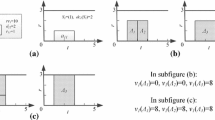Abstract
The resource scheduling problem in a multi-project environment extends job-shop scheduling problems by allowing for task dependency and multiple self-interested entities. In this paper we deal with short-term scheduling of resources, which are shared by multiple projects. In specific, we address the dynamic nature of the situation. We model this as a dynamic economy, where the multiple local markets are established and cleared over time, trading resource time slots (goods). Due to the dynamic and distributed nature of the economy, through our approach we can achieve higher levels of flexibility, scalability and adaptability. Unlike most market-based mechanisms, which are based on equilibrium concepts and iterative adjustment of resources prices, we propose a novel market mechanism called precedence cost tâtonnement (P-TâTO), which solves individual resource-constrained local resource scheduling in an optimal way, and searches for a precedence conflict-free schedule through a tâtonnement type procedure. In this paper, we discuss our dynamic economy model and some details of the market mechanism along with empirical analysis results.
Similar content being viewed by others
References
Balakrishnan, A., Kumara, S. R. T. and Sundaresan, S. (1999) Manufacturing in the digital age: Exploring information technologies for product realization. Information Systems Frontiers, 1, 25-50.
Corkill, D. D. and Lander, S. E. (1998) Diversity in Agent Organization, Working Paper, Blackboard Technology.
Drexl, A. (1991) Scheduling of project networks by job assignment. Management Science, 37, 1590-1602.
Kolisch, R., Sprecher, A. and Drexl, A. (1992) Characterization and Generation of a General Class of Resource-Constrained Project Scheduling Problems, Research Report No. 301, Institut für Betriebswirtschaftslehre der Universität Kiel, Germany.
Kolisch, R. and Sprecher, A. (1996) PSPLIB—a Project Scheduling Problem Library, Research Report No. 396, Institut für Betriebswirtschaftslehre der Universität Kiel, Germany.
Lee, Y.-H. (2002) Market-based dynamic resource control of distributed multiple projects. Ph.D. thesis, The Pennsylvania State University.
Patterson, J. H. (1984) A comparison of exact approaches for solving the multiple constrained resource project scheduling problem. Management Science, 30, 854-867.
Petrie, C. J. (1998) Process Coordination, Web Page, http://cdr.stanford.edu/ProcessLink/papers/white-dpm.html.
Shen, W. and Norrie, D. H. (1999) Agent-based systems for intelligent manufacturing: State-of-the-art survey. International Journal of Knowledge and Information Systems, 1, 129-156.
Varian, H. R. (1984) Microeconomic Analysis, W. W. Norton and Company, New York, NY.
Vries, S. de. and Vohra, R. (2000) Combinatorial auctions: A brief survey. Working Paper, Department of Managerial Economics and Decision Science, Northwestern University.
Walras, L. (1954) Elements of Pure Economics, translated by William Jaffè, Allen and Unwin, London, UK.
Author information
Authors and Affiliations
Rights and permissions
About this article
Cite this article
Lee, YH., Kumara, S.R.T. & Chatterjee, K. Multiagent based dynamic resource scheduling for distributed multiple projects using a market mechanism. Journal of Intelligent Manufacturing 14, 471–484 (2003). https://doi.org/10.1023/A:1025753309346
Issue Date:
DOI: https://doi.org/10.1023/A:1025753309346




